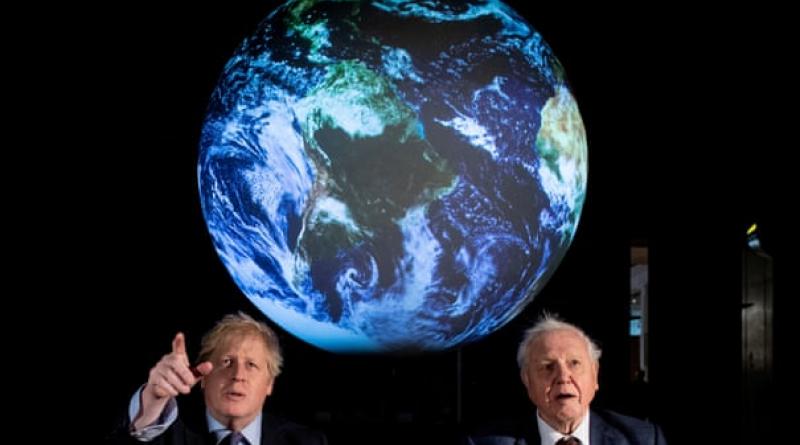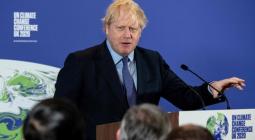UK vows to outdo other economies with 68% emissions cuts by 2030.

Boris Johnson promises to go further and faster by setting target of 68% reduction in annual carbon emissions.
The UK will cut greenhouse gas emissions further and faster than any other major economy in the next decade, according to a new carbon target set out by the prime minister.
There will be a reduction of 68% in annual carbon emissions by 2030, compared with 1990 levels, a significant increase on the current target of about 57% reductions. The raising of ambition on tackling climate breakdown is intended to galvanise other countries to follow suit, as Boris Johnson prepares to co-host a virtual summit of world leaders on the climate next week.
The prime minister said on Thursday: “We have proven we can reduce our emissions and create hundreds of thousands of jobs in the process. We are taking the lead with an ambitious new target to reduce our emissions by 2030, faster than any major economy … The UK is urging world leaders to bring forward their own ambitious plans to cut emissions and set net zero [carbon] targets.”
The target – called an NDC, or nationally determined contribution – will be submitted to the UN as part of the UK’s pledge under the 2015 Paris climate agreement. The UK will host the Cop26 UN climate talks, aimed at giving fresh impetus to the Paris accord, in Glasgow in November 2021, to which next week’s summit of world leaders is a staging post.
The new target follows the advice of the government’s statutory advisers, the committee on climate change, which found the costs of cutting emissions had fallen rapidly in the past few years. The committee said the 2030 target would set the UK on the path to net zero emissions by 2050, the long-term goal enshrined in law under Theresa May.
But campaigners and climate experts said the government should have gone further to seize the opportunities offered in green jobs and low-carbon economic growth as the UK struggles to emerge from the coronavirus crisis.
Ed Matthew, a Cop26 co-director for the Climate Coalition, which comprises 140 civil society groups with 22 million members, said: “This is important progress but not sufficient. A more ambitious cut is both feasible and necessary to keep us safe, and reflect our massive historic carbon emissions. We must remember, too, that the climate will not respond to targets, it will respond to carbon cuts. It is action that counts.”
Environmental and poverty campaigners wrote to Johnson last month urging a target of 75% cuts, which they said were a stretch but feasible. Research by WWF and Imperial College London suggested a 72% target would stimulate the UK’s green economy.
The Treasury is understood to have been concerned about the potential cost of emissions cuts falling on consumers.
Campaigners also warned that the government would need to produce a coherent plan to reach the stiffer target, as current policies were inadequate. John Sauven, the executive director of Greenpeace UK, said: “The government must now increase the action needed to cut emissions from our homes, roads, farms and power sources in the UK. If we want the future to look as different as possible from the crisis-ravaged world of 2020, then tackling the climate emergency, rebooting the economy and creating thousands of new green jobs is the only real option.”
Ed Miliband, the shadow business secretary, said the current carbon budget set for 2023 would probably be missed, as the government over the past decade had not brought forward policies to fulfil the aims. He said: “It is clear there is now a yawning gap between the government’s aspirations and its policies to deliver them. The government didn’t have the policies to meet their previous target, and the chasm will be even greater now.”
Last month, Johnson set out a 10-point plan that he said would start a green industrial revolution, and included a commitment to phase out petrol and diesel cars, build new offshore windfarms and invest in hydrogen fuel. However, critics said the plans were insufficient and inadequately funded, and pointed to parallel plans that were likely to increase emissions by building £27bn of new roads, and hundreds of thousands of new houses that will not adhere to net zero carbon standards.
An analysis by the Guardian and Vivid Economics showed the UK was still spending much of its Covid-19 rescue package on high-carbon activities, reducing the impact of the “green recovery” Johnson had pledged.
Ministers are understood to be preparing more policies to supplement the 10-point plan and the NDC, including an energy white paper before the end of the year that will set out some new measures.
Businesses also called for more detail from the government. Rain Newton-Smith, chief economist at the Confederation of British Industry employers’ organisation, said: “While [the 2030 target] undoubtedly represents a real stretch, there is no doubt that business is up for the challenge as we build back better and greener following the pandemic. Publishing the energy white paper as soon as possible, and moving with speed, determination and greater ambition to deliver the policies in the government’s 10-point plan, is essential to our success.”
Other major world economies are also expected to come forward with NDCs, to join the scores of smaller economies that have already done so. EU leaders will meet next week to decide on a potential 55% emissions cut by 2030, and the US president-elect, Joe Biden, is planning to rejoin the Paris agreement when he takes office. China has set a goal of peaking emissions by 2030 but has not yet submitted a formal plan to the UN. Japan has submitted a plan but is under pressure to revise it.
4 December 2020
The Guardian




